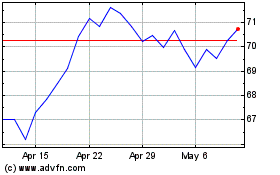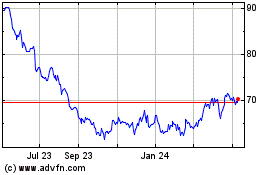Australia Growth Data Raises Prospect Winning Streak Is Ending
December 06 2016 - 8:50PM
Dow Jones News
SYDNEY—Australia's economy recorded its first negative quarter
of growth since early 2011, raising the prospect that the longest
ongoing winning streak in the developed world may be coming to an
end.
Gross domestic product, the broadest measure of economic output,
fell 0.5% in the three months through September from the quarter
before. The resource-rich economy expanded 1.8% from a year
earlier, the slowest pace in more than three years. Economists
surveyed by The Wall Street Journal expected the economy to
contract by 0.1% from the previous quarter and grow by 2.2% from a
year earlier.
Australia has been enjoying the longest economic expansion in
the developed world today—25 years and counting. But the commodity
boom that underpinned its growth is ending. Other resource-reliant
economies are tumbling into recession. Resource companies have shed
thousands of workers as mining projects were completed, while
others were scrapped.
Some economists say a shift in investment away from mining and
into other industries such as services appears to have stalled.
Australian companies scaled back investment spending by 4.0% in the
three months through September compared with the previous
quarter.
"The transition towards non-mining investment is taking place at
a snail's pace," Capital Economics said in a recent note.
Most economists, and the country's central bank, think Australia
has headroom to avoid a recession.
"While a contraction will no doubt invite talk of a
recession…we, like the Reserve Bank of Australia, see growth
bouncing back again," Shane Oliver, Sydney-based chief economist at
AMP Capital Investors—one of Australia's biggest fund managers—said
ahead of Wednesday's growth data.
Still, cracks are appearing in the economy. While Australia's
jobless rate has fallen recently, many of the new jobs being
created are part-time positions in service jobs, such as cashiers
and baristas. That is contributing to the worst wage growth on
record and stubbornly low overall inflation, since wages are a
major business cost. The labor participation rate—the share of
Australians either working or actively looking for work—has slumped
to a decade low.
Meanwhile, record-low interest rates—currently at 1.5%—have
fanned a property investment boom, with high-rise apartments
sprouting up in previously downtrodden suburbs of big east coast
cities like Sydney. Foreign investors have played a major role in
driving up prices for everything from waterfront homes to cramped
studio apartments. Economists and the central bank now worry about
a possible glut of new apartments, which could weigh on prices and
hit borrowers who have taken on record high levels of debt.
At the same time, industries such as manufacturing—which once
supplied a steady stream of full-time jobs—have struggled to
rebound after the mining boom drove up the Australian dollar, which
made it costlier to produce goods locally.
U.S. food company General Mills Inc., which makes everything
from Betty Crocker cake mixes to Latina pasta sauces and Old El
Paso Mexican foods, recently said it would close one Australian
manufacturing plant, in Victoria state, and shift some production
to its Sydney factory.
General Mills is cutting as many as 600 jobs globally as it
struggles to boost sales, as customers shift to less-processed and
sugary foods. The company, which expanded its Mt. Waverley facility
in suburban Melbourne only three years ago, creating 40 new jobs,
said in a statement last month it was simplifying its supply chain
to "secure the future growth of the business."
A generation of Australians has grown up without the pain of
rising unemployment and widespread business failures. The last time
the country underwent a recession—commonly defined as two straight
quarters of contraction—was in the early 1990s, when interest rates
were raised to 18% to head off a credit boom. The country's jobless
rate peaked at 11.2%, double the current level.
Reserve Bank of Australia Gov. Philip Lowe said Tuesday the
economy was likely to slow in the final months of 2016 before
picking up again. Commodity prices have recovered recently
"providing a boost to national income," although they remain much
lower than they have been in recent years, Mr. Lowe said, as he
said official rates would remain unchanged for a fourth-straight
month.
Some economists are more pessimistic. Citi Research economists
said the central bank governor's remark Tuesday about growth
picking up again after slowing into the year's end is "very much a
forecast."
"The sharper-than-expected slowdown may be temporary, but
equally it may not," Citi said in a note ahead of the GDP data.
Write to Rachel Pannett at rachel.pannett@wsj.com
(END) Dow Jones Newswires
December 06, 2016 20:35 ET (01:35 GMT)
Copyright (c) 2016 Dow Jones & Company, Inc.
General Mills (NYSE:GIS)
Historical Stock Chart
From Mar 2024 to Apr 2024

General Mills (NYSE:GIS)
Historical Stock Chart
From Apr 2023 to Apr 2024
